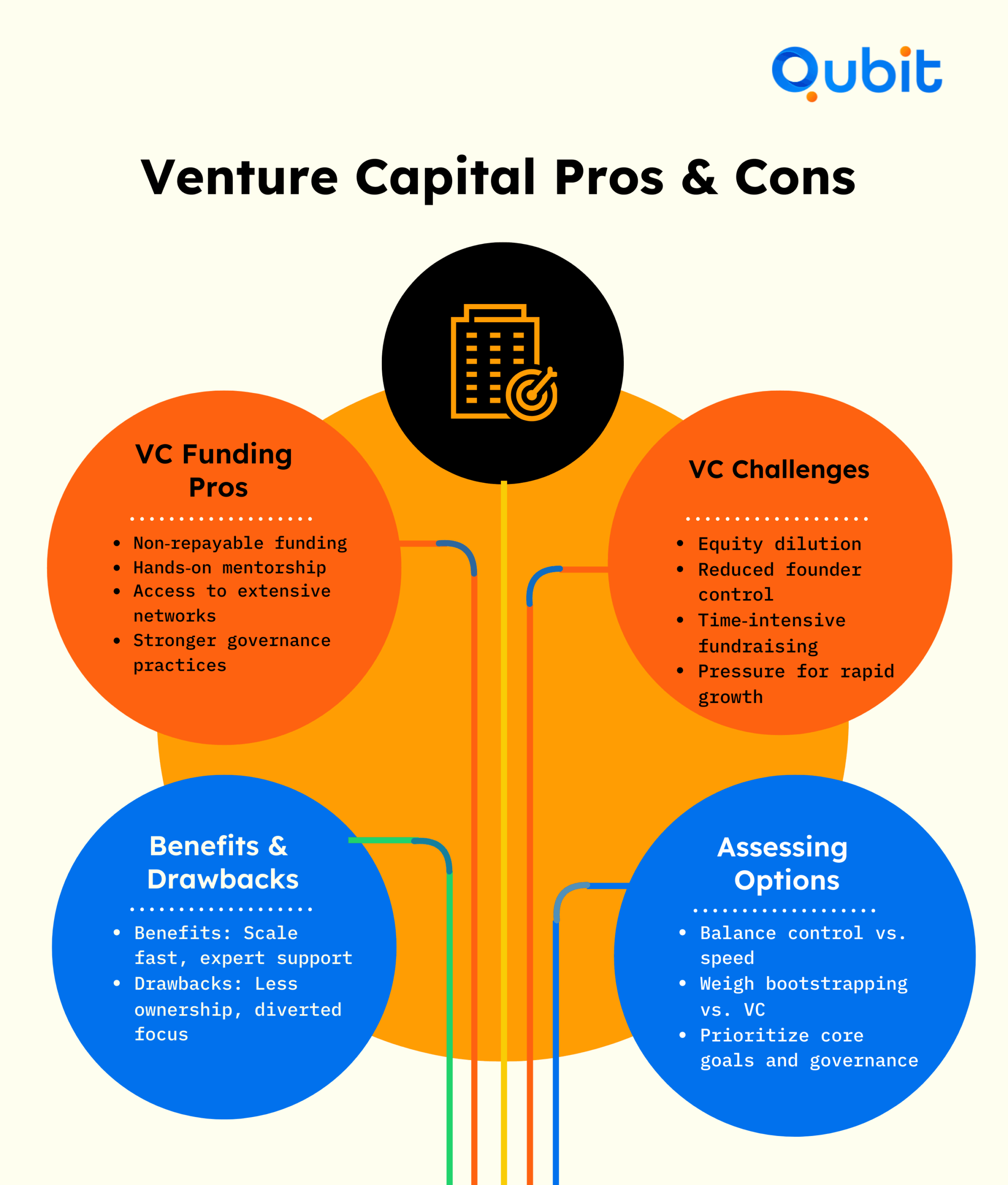Venture capital plays a pivotal role in transforming innovative ideas into thriving businesses. But "what is venture capital"? It is defined as funding provided by investors to startups and early-stage companies with high growth potential, venture capital serves as a critical lifeline for entrepreneurs aiming to scale their operations. Beyond financial backing, it offers strategic guidance, industry connections, and mentorship, enabling startups to overcome hurdles and accelerate their growth trajectory.
Startup founders often begin their journey by exploring startup fundraising strategies to secure initial capital and set the foundation for growth. This foundational step highlights the importance of understanding funding mechanisms, including venture capital, to navigate the competitive startup ecosystem effectively.
In this article, we’ll delve into how venture capital fuels startup growth across various funding stages, examining challenges, opportunities, and actionable strategies. Let’s jump right in.
Venture Capital Growth Overview
Venture capital is among the fundraising best practices for startups. It plays a pivotal role in fueling economic innovation and growth. Often misunderstood, it’s not just about funding; venture capitalists act as strategic partners, guiding startups through critical stages of development. To define venture capital, it’s a form of private equity financing provided to early-stage companies with high growth potential. Dispelling myths, venture capital isn’t solely about chasing profits—it’s about fostering groundbreaking ideas and supporting entrepreneurs in building sustainable businesses.
By offering expertise, networks, and resources, venture capitalists help startups scale effectively while mitigating risks. Their involvement goes beyond financial backing, creating a collaborative environment where founders can thrive. Understanding the venture capital meaning reveals its transformative impact on industries, driving innovation and creating jobs. This partnership between investors and entrepreneurs is a cornerstone of modern economic progress.
Partnering with Educational and Corporate Resources
Access to both academic and corporate resources can significantly enhance the understanding of what is venture capital. By connecting with platforms like Harvard Business Publishing, individuals gain valuable insights through subscription services and curated corporate information. These resources serve as a bridge to deeper knowledge, offering tools and case studies that illuminate venture capital strategies and practices.
Whether you're exploring academic theories or corporate applications, these partnerships act as gateways to a wealth of information, ensuring a well-rounded perspective for anyone interested in the venture capital ecosystem.
Understanding the Mechanics of Venture Capital
Venture capital funding plays a pivotal role in fueling the growth of startups with high potential. This form of private investment provides emerging businesses with the financial resources they need to scale, often in exchange for equity. Beyond monetary support, venture capitalists frequently offer mentorship and strategic guidance to help founders refine their business models and navigate early-stage challenges.
The process typically involves startups trading a portion of their ownership for capital, which can be instrumental in accelerating development and market entry. However, venture capital investing is not without its risks. Investors face the possibility of losing their entire investment if the startup fails, while founders relinquish some control over their company. On the flip side, successful ventures can yield substantial rewards, including exponential returns for investors and rapid growth for startups.
A solid startup operations strategy ensures that the venture capital received translates into efficient workflows and scalable growth. Scaling startup after fundraising is crucial to leveraging capital for expansion and market positioning.
Evaluating the Pros and Cons of Venture Capital for Your Startup

Securing venture capital can be transformative for startups, but it comes with its own set of challenges. Venture capital offers non-repayable funding, enabling businesses to scale without the burden of debt. Additionally, startups benefit from expert advice and access to extensive networking opportunities, which can accelerate growth and open doors to strategic partnerships.
However, the trade-offs are significant. Founders often face equity dilution, which reduces their ownership stake in the company. This can lead to a loss of control over decision-making processes. Moreover, the pursuit of venture capital can distract startups from focusing on core business goals, as pitching and managing investor relationships demand substantial time and effort. There's also the risk of increased pressure to achieve rapid growth, which may lead to operational missteps.
Venture capital fuels startup growth by providing larger-scale funding, expert guidance, and extensive networking opportunities. These benefits help startups scale quickly, though they often must exchange a portion of equity for such support. You should also discover how corporate governance in startups plays a pivotal role in building investor confidence post-funding.
Exploring Alternative Funding Avenues Beyond Venture Capital
Securing funding is often a critical challenge for startups, but venture capital investing isn't the only path forward. Entrepreneurs can explore diverse options like angel investors, incubators, accelerators, corporate venture capital, and crowdfunding. Each of these alternatives offers unique benefits and trade-offs, particularly in terms of risk and control.
Angel investors, for instance, provide early-stage funding and often bring valuable mentorship, but their involvement might come with less formal oversight compared to traditional venture capital funding. On the other hand, incubators and accelerators focus on nurturing startups through resources and guidance, often in exchange for equity. Corporate venture capital, as detailed in this Forbes article, offers strategic partnerships but may align the startup’s goals with corporate interests. Crowdfunding, meanwhile, democratizes funding but requires significant effort to build public interest.
For founders, understanding these alternatives and avoiding common startup funding mistakes can pave the way for sustainable growth.
Mastering the Art of Pitching to Venture Capitalists
Crafting a persuasive pitch for venture capital investing requires precision and preparation. A professional pitch deck serves as the cornerstone of your presentation, showcasing your business vision, market opportunity, and financial projections. This document should be visually appealing, concise, and tailored to the specific interests of venture capital firms.
Equally important is conducting thorough research to identify firms that align with your industry and growth stage. Start by analyzing their portfolio to understand their investment patterns and preferences. Once you've pinpointed potential partners, initiate contact with a personalized approach—highlighting how your venture complements their expertise.
Meeting due diligence requirements is the next step in securing venture capital funding. Be prepared to provide detailed financial records, operational insights, and growth strategies. This transparency builds trust and demonstrates your readiness for a long-term partnership.
Strong investor relations after funding pave the way for sustained support and potential future rounds of funding. Mastering these elements not only increases your chances of securing funding but also establishes a foundation for lasting collaboration with venture capitalists.
Strategic Mentorship and Networking Through Venture Capital
Venture capital extends beyond financial support by offering seasoned mentorship and expansive networking opportunities. This partnership brings founders face-to-face with experts who have a deep understanding of market dynamics and operational challenges. These mentors guide startups through decision-making processes, helping them build sustainable growth models and avoid common pitfalls. Founders can refine their business strategies, benefit from tailored advice, and tap into valuable industry insights that only experienced professionals can provide.
Key benefits of this collaborative approach include:
- Experienced Mentors: Access insights from professionals with a track record of scaling businesses.
- Extensive Networks: Connect with potential partners, customers, and additional investors.
- Guided Strategic Planning: Receive actionable advice that aligns with market trends.
- Risk Management Advice: Learn strategies to navigate challenges effectively.
Short, focused consultations and regular check-ins allow founders to make informed decisions while adapting to emerging trends. These relationships foster a proactive culture where continuous learning and strategic adjustments become integral to success.
By integrating mentorship with strong networking, startups create a foundation that supports not only immediate growth but also long-term resilience and scalability. This dynamic interaction builds a robust support system that drives operational excellence and market relevance.
Sustainable Growth and Long-Term Strategy Through VC Investment
Venture capital fuels long-term success by promoting sustainable growth strategies. Capital injections allow startups to invest in refining business models, scaling operations, and capturing new market segments.
With guidance from venture capitalists, founders are encouraged to adopt performance metrics and efficient practices that ensure stability and continuous improvement. Establishing a culture of accountability and innovation is key to enduring success.
Essential components of a sustainable growth strategy include:
- Innovative Business Models: Develop and iterate on concepts that adapt to changing market demands.
- Operational Efficiency: Streamline processes to reduce costs and boost productivity.
- Market Expansion Tactics: Utilize strategic partnerships and targeted campaigns to reach new customers.
- Ongoing Performance Monitoring: Track key metrics to adjust strategies in real time.
Regular reviews and data-driven decision-making enable startups to remain agile in competitive environments. The guidance provided by venture capitalists helps align investments with long-term objectives. This approach not only mitigates risks but also ensures that operational adjustments lead to scalable improvements. Fostering a disciplined and innovative environment, startups can navigate market challenges effectively, paving the way for enduring growth and profitability.
Conclusion
Securing venture capital is a transformative step for startups, fueling growth across various funding stages. From seed rounds to Series C and beyond, each stage demands a tailored approach that combines strategic planning with compelling storytelling. A data-driven narrative, paired with targeted pitch strategies, can significantly enhance your ability to attract the right investors.
Equally important is the effective use of support services and resources to maximize the impact of VC funding. Whether it's refining your business model or scaling operations, thoughtful planning ensures that every dollar invested drives measurable results.
If you're aiming to accelerate your growth journey, we at Qubit Capital are ready to help with our Fundraising Assistance service. Contact us today to get started.
Key Takeaways
- Venture capital is a multi-stage catalyst that drives startup growth.
- Each funding stage, from pre-seed to IPO, offers unique opportunities and challenges.
- A strong pitch deck and strategic planning are essential for securing VC funding.
- Alternative funding options provide diverse pathways to growth.
- Robust internal linking and actionable insights create a comprehensive roadmap for startup success.
Frequently asked Questions
How does venture capital help startups?
Venture capital provides critical funding, mentorship, and networking opportunities that help startups scale rapidly, refine operations, and secure market traction.


 Back
Back



